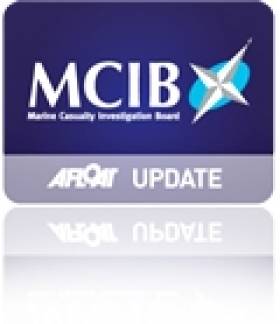Displaying items by tag: Qulity
Loss of Buoyancy Led to Drowning of Lady Eileen Crew - MCIB
#MCIB - Overloading of the boat deck and a missing hatch at the stern may have caused a fatal loss of buoyancy that led to the drowning of two fishermen off Co Clare last year, according to the official report into the incident.
As previously reported on Afloat.ie, the remains of the two fishermen were found by local divers at the wheelhouse of their sunken boat near Spanish Point on 14 August 2012 during a search operation for the fishing vessel Lady Eileen.
Their craft had been reported missing the previous day after they failed to return from a trip to mend snagged nets, and a massive search operation was mounted after debris and diesel were discovered in the water close to Spanish Point that evening.
The two men lost were later named as owner/skipper Michael Galvin and crew Noel Dickinson, both of Quilty in Co Clare.
In its official report into the incident, the Marine Casualty Investigation Board (MCIB) found that the vessel had a low freeboard, such that even in an unladen condition it would not have to heel by a significant degree to take water on the deck.
With the weight of nets and the seawater tank used to store crustaceans, the vessel's freeboard was reduced such that water would be allowed to "flow freely on to the deck even in very calm weather conditions". This is water that would not be quickly released, with potentially very serious effects on the craft's buoyancy.
In addition, a panel removed by Galvin some weeks before to do repair work on the sterngear appeared not to have been replaced, possibly allowing a catastrophic amount of water on deck if the boat encountered wind or wave action.
With no witnesses to the incident it is unknown exactly what happened to cause the boat to be swamped, though it is thought to have transpired very quickly as neither man was wearing a lifejacket and the boat's manually operated emergency beacon in the wheelhouse was not activated.
Among the MCIB's recommendations is that the Minister for Transport reviews the Code of Practice for fishing vessels under 15m to devise new stability criteria.
Volunteers participating in search operations have also been urged to co-ordinate their assistance, after an open boat with three on board was capsized by waves while searching for the Lady Eileen and its crew.
All were thrown overboard though were quickly rescued by Garda divers in the area.
The full report from the MCIB is available to download below.
























































